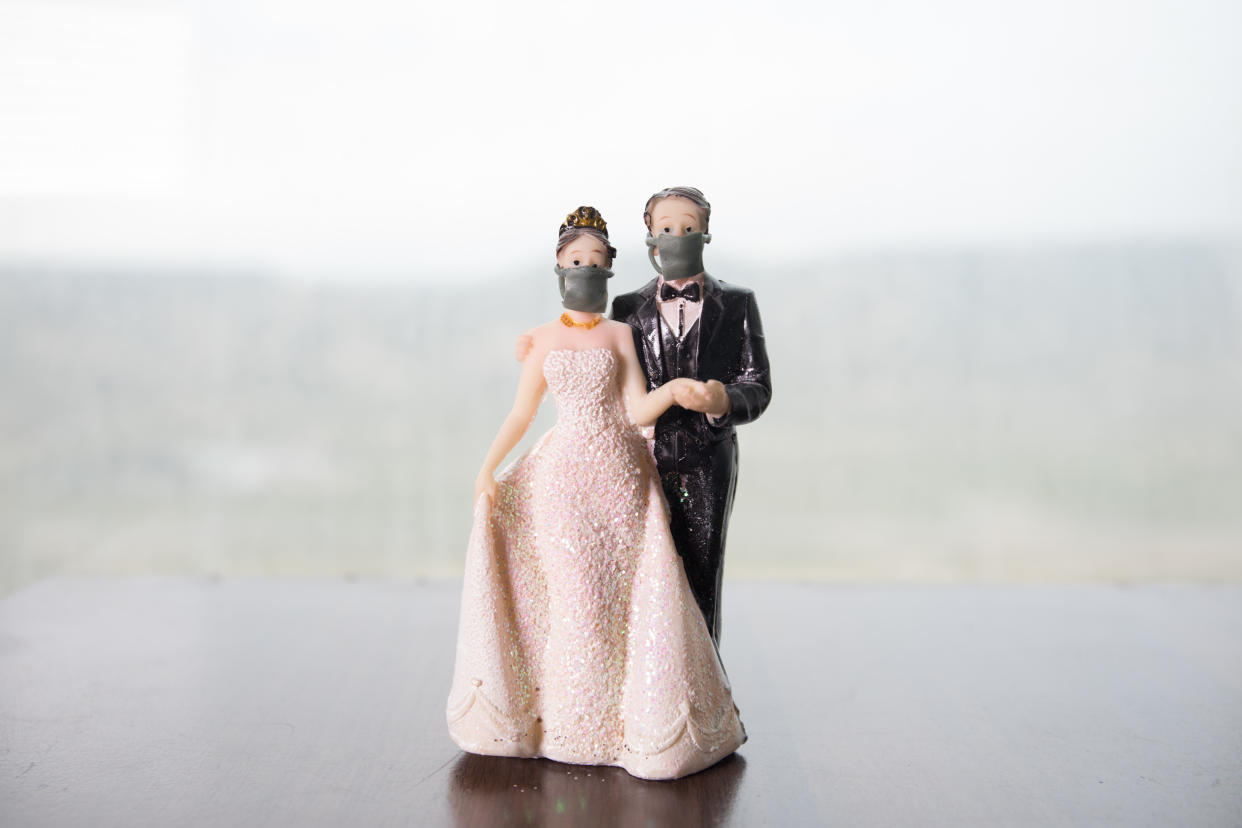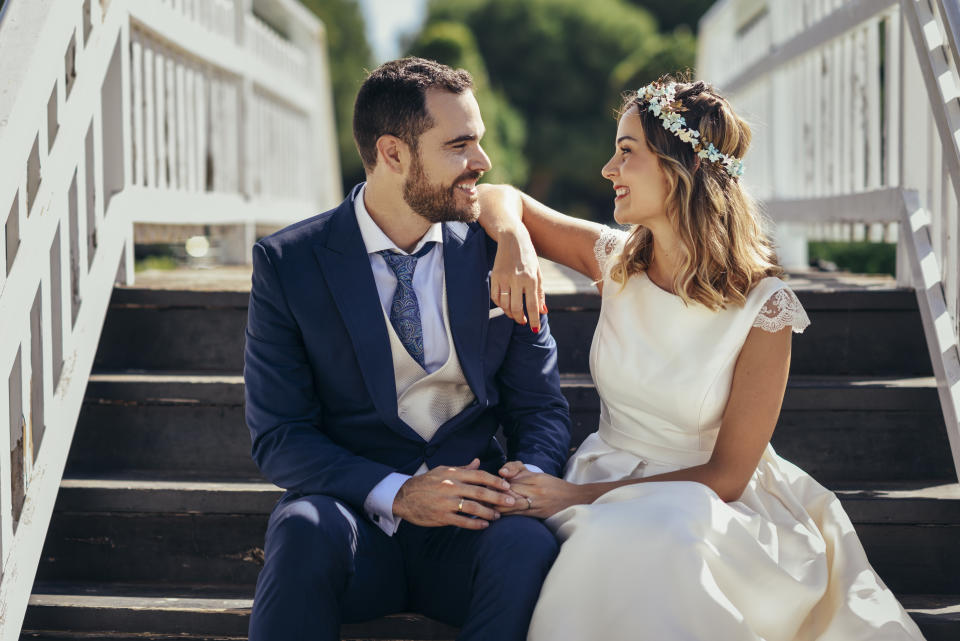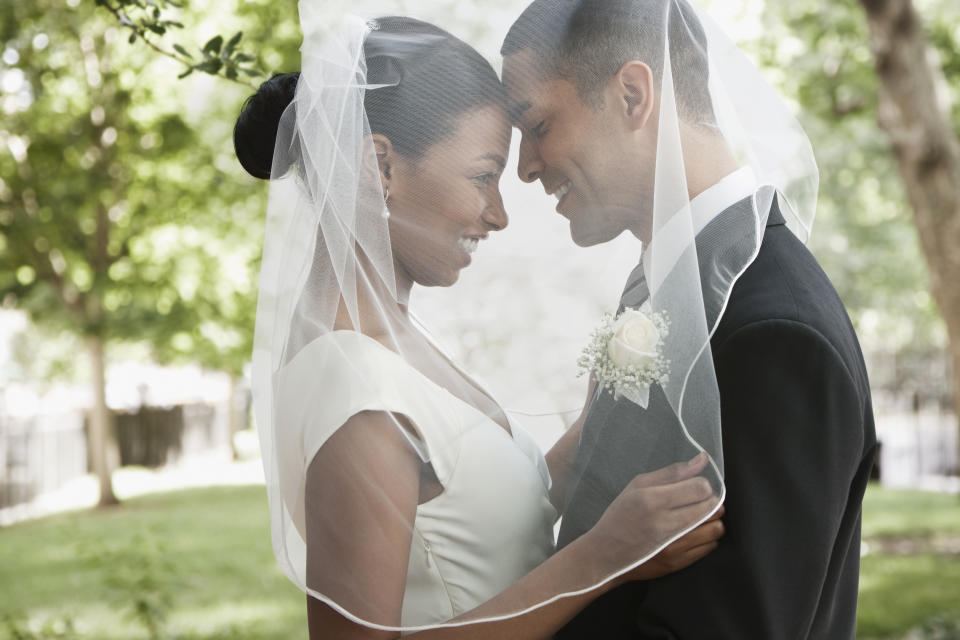Brides are switching gears for their summer weddings: 'I never had a back-up plan for an international pandemic'

If all had gone to plan, Vanessa Charles and her fiancé would be getting married in Greece on Sept. 1. The coronavirus pandemic derailed the couple’s dreams of a wedding abroad, along with the deposits they’d put down. But their determination to say “I do” this summer hasn’t waned, and with states easing shelter-in-place restrictions regarding weddings, churches and other venues, the show will go on — with a few significant adjustments.
Charles has scrapped her destination wedding in Greece in favor of a ceremony with 100-plus guests in Madeira Beach, Fla. this August. Aspects of the event, including dancing and dining options, still hinge on the state’s reopening progress, and guests will receive custom face masks featuring the couple’s wedding date “for everyone to wear and a fun keepsake to remember this time in history,” she tells Yahoo Life.
Though many couples pushed back their planned nuptials due to the pandemic, Charles says the crisis “made us realize how much we’d really like to be surrounded by the people we love on our big day.”
Well, almost. Of the more than 100 guests invited to join the celebration, just one — the intended officiant — has expressed concerns about taking part in light of the risks of transmission and fears of a second wave.
“They live in Michigan and are older and don’t feel comfortable flying just yet,” explains the bride-to-be of the intended officiant and her spouse.
“I understand her concerns though,” she adds. “Michigan is in a much different situation that we are here in Florida, so we will do what we have to if she decides it’s not smart for her to come.”

Lisa Glover, who is proceeding with her plans to wed in July, has also experienced some pushback from a number of people invited to her ceremony.
“A decent amount of our guests have expressed concern and fear of a second wave happening, and urging us to postpone our mid-July wedding, even as our county’s venue begins to reopen,” says Glover, who will wed in a suburb of Philadelphia. “It’s been heartbreaking to see the plans we spent a year working on becoming destroyed. We cannot predict the future, or know the answer to the ‘what if’s,’ and so we have to follow what we feel in our hearts is right. If some people aren’t comfortable attending, we understand and will miss them.”
While bans on gatherings larger than a handful of people during the peak of the pandemic gave couples no choice but to postpone their plans or pivot to Zoom ceremonies, the gradual return to “business as usual” offers less clarity for some couples. Many are in a holding pattern, weighing health and safety concerns against the threat of losing hefty deposits. Long-held plans remain subject to state guidelines and venue restrictions, any of which could change with little notice. And then there are the guests, who may be wary of traveling or taking part in a large event; are considered high-risk; or have been hit by the economic downturn and are unable to afford the costs associated with attending a wedding. Though her big day is just a little over a month away, Glover admits that it’s still possible that it could be postponed at the last minute; she even has a back-up date for next summer just in case.
“Our decisions for postponing the wedding, should it come to that, will come down to three things,” the tech industry publicist says. “Will masks be required? Will we have to reduce our guest capacity? Will we be able to have our dance floor? If any of those things are a ‘yes,’ we will automatically postpone.
“I didn’t wait 30 years to get married just to have the wedding of my dreams compromised or feel different than how it should,” she adds. “While I always knew weather would be out of my control, I never had a back-up plan for an international pandemic.”
That’s a familiar sentiment for Atlanta-based wedding planner Laura Burchfield, who says her industry has been scrambling to keep up with a backlog of postponed wedding dates — which now flood the 2021 calendar — as well as revised vendor contracts, a significantly slower 2020 wedding season, and unclear guidelines on how to proceed. Of the 17 weddings she had booked for 2020 — a major drop from the norm of 28 to 35 — nine have been postponed and three canceled.
“These are couples that booked in 2019 and that have sent save-the-dates and/or invitations to 200-300 of their [family members] and friends,” she says of those who have chosen to put their plans on pause. “Weddings that we were almost finished planning and booking vendors on. The couples' wedding vision had already been created. Asking a couple to all of a sudden contact 100 to 200 people to essentially uninvite them and scale back on what they had already envisioned in their minds was not even an option. No one was interested in making their whole wedding virtual or only having 10 people ... and I 100 percent get that!”

Working around COVID-19 restrictions, even as some bans are lifted, just isn’t practical for many couples, she says.
“I have seen many, new, creative and unique ideas for weddings moving forward to include social distancing, a virtual aspect, an outside-of-the-box way to have their special day during these times, but in my opinion, that is only going to work for those that are just now getting engaged or are starting the planning process with that in mind,” Burchfield says. “This is not something that I see couples getting on board with that have already planned their 250-person wedding, invited the people, created and booked the massive décor elements, chosen their food menus, etc.
“I also believe that there are people that have imagined and planned their weddings in their minds since they were young, and that is what they want, and they will not settle for anything different,” she notes. “Those are the people that will wait. They will hold off and do it their way once it can feasibly happen.”
Bride-to-be Charles sees it differently.
“We want to be married!” she says. “We have been together for six years now and we don’t want to wait any longer. If people are uncomfortable coming we 100 percent understand that and would never be offended considering the circumstances. Facing so much death and sadness made us realize we want to be married while surrounded by people we love. For us, it’s more important to solidify our marriage than to have the perfect Instagram wedding.”
Glover agrees that “in the end, health is all that matters,” and feels grateful that her loved ones have remained healthy during the pandemic. But she admits struggling with some “initial feelings of anger and sadness” that her original vision wouldn’t pan out.
“As if wedding planning wasn’t stressful enough, throw a pandemic into the mix and you’ll really test your mental and emotional strength,” she says.
Dr. Jen Hartstein, Yahoo Life Mental Health contributor and practicing psychologist, says it’s natural for couples impacted by the pandemic to feel let down.
“So much planning goes into a wedding and so many hopes are pinned on that day,” Hartstein tells Yahoo Life. “Brides and grooms want to share in the joy with loved ones and really have a celebration. When that changes, disappointment is to be expected.”
She cautions that it’s important for couples to maintain their perspective and not take guests backing out of an invite as a personal slight.
“It’s often hard to balance disappointment and empathy for many of us,” she says. “Couples may have to move through the disappointment to get to a place of acceptance. This is a challenging time for many, for a variety of reasons (economic, anxiety, concerns about illness) and that will impact people’s choices right now. It’s important that couples take a breath, step into a place of acceptance and recognize that their loved ones can support them from afar, even if they can’t be there in person. Maybe it provides an opportunity to include them in creative ways, via FaceTime or Zoom or something.”
It is OK to acknowledge feeling grief over what might have been — the guests who couldn’t come, the plans that had to be ditched — but ultimately, the way forward is to realize that a wedding is so much more than any one event.
“At the end of the day, although we focus so much on the wedding, it’s about the marriage,” Hartstein says. “Keeping your eye on the long-term goal of a happy and long-lasting marriage can help. And don’t diminish the disappointment. It’s real. Just don’t get stuck there.”
For the latest coronavirus news and updates, follow along at https://news.yahoo.com/coronavirus. According to experts, people over 60 and those who are immunocompromised continue to be the most at risk. If you have questions, please reference the CDC’s and WHO’s resource guides.
How to maintain your physical and mental health during the pandemic
Taking care of a loved one with COVID-19? Here’s how to stay healthy
Q&A with Dr. Kavita Patel: How to keep your family safe and maintain your mental health
Read more from Yahoo Life:
High school holds personal, front-yard graduation ceremonies for seniors
The Unwind: How we're finding calm during quarantine, from meditation to 3-minute dance parties
Want daily lifestyle and wellness news delivered to your inbox? Sign up here for Yahoo Life’s newsletter.



